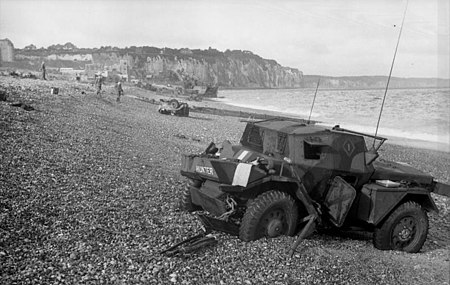Dieppe Raid
Coordinates: 49.9333°N 1.0833°E

An abandoned British
Daimler Dingo on the beach
Date: 19 August 1942
Location: Dieppe, France; 49.9333°N 1.0833°E
Result: German victory
Commanders and leaders
United Kingdom:
Louis Mountbatten
Canada: John Roberts
United Kingdom: Trafford Leigh-Mallory
United Kingdom: John Hughes-Hallett
United Kingdom: Lord Lovat
Nazi Germany: Gerd von Rundstedt
Nazi Germany: Konrad Haase
Operation Jubilee or the
Dieppe Raid (19 August 1942) was a disastrous Allied amphibious attack on the German-occupied port of Dieppe in northern France, during the Second World War. Over 6,050 infantry, predominantly Canadian, supported by a regiment of tanks, were put ashore from a naval force operating under the protection of Royal Air Force (RAF) fighters.
The port was to be captured and held for a short period, to test the feasibility of a landing and to gather intelligence. German coastal defences, port structures and important buildings were to be demolished. The raid was intended to boost Allied morale, demonstrate the commitment of the United Kingdom to re-open the Western Front and support the Soviet Union, fighting on the Eastern Front.
The Luftwaffe made a maximum effort against the landing as the RAF had expected, and the RAF lost 106 aircraft (at least 32 to anti-aircraft fire or accidents) against 48 German losses. The Royal Navy lost 33 landing craft and a destroyer. Aerial and naval support was insufficient to enable the ground forces to achieve their objectives. The tanks were trapped on the beach and the infantry was largely prevented from entering the town by obstacles and German fire.
After less than six hours, mounting casualties forced a retreat. Within ten hours, 3,623 of the 6,086 men who landed had been killed, wounded, or taken prisoner. 5,000 were Canadians, who suffered a 68 percent casualty rate, with 3,367 killed, wounded or taken prisoner. The operation was a fiasco in which only one landing force temporarily achieved its objective, and a small amount of military intelligence was gathered.
Both sides learned important lessons regarding coastal assaults. The Allies learned lessons that influenced the success of the D-Day landings. Artificial harbours were declared crucial, tanks were adapted specifically for beaches, a new integrated tactical air force strengthened ground support, and capturing a major port at the outset was no longer seen as a priority. Churchill and Mountbatten both claimed that these lessons had outweighed the cost. The Germans also believed that Dieppe was a learning experience and made a considerable effort to improve the way they defended the occupied coastlines of Europe.
{snip}
